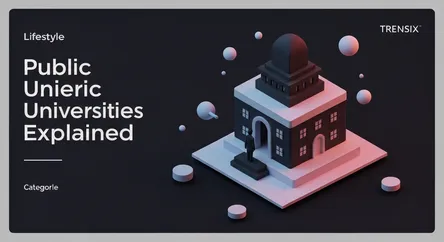Lifestyle
Public Universities Explained

Discover what makes a public university a cornerstone of higher education. Learn about its funding, accessibility, and impact on society and students.
What is it?
A public university is an institution of higher learning that is predominantly funded by a state or national government, as opposed to private universities which rely more on tuition and endowments. This public funding model often results in significantly lower tuition costs for students who are residents of that state or country. Public universities are typically large institutions that serve a diverse student body and are mandated to provide accessible and affordable education to the general public. They offer a wide array of undergraduate, graduate, and professional degree programs, contributing to both individual advancement and societal well-being.
Why is it trending?
Amidst rising tuition costs and mounting student loan debt, public universities are trending as a more financially viable path to a degree. The conversation around educational equity and accessibility has put a spotlight on these institutions as key drivers of social mobility. They are recognized for offering high-quality education and extensive research opportunities at a fraction of the cost of many private counterparts. As families become more budget-conscious, the value proposition offered by state schools—combining academic rigor with affordability—has become increasingly compelling, making them a top choice for students worldwide.
How does it affect people?
Public universities profoundly affect individuals and communities by creating pathways to higher education for a broader segment of the population. For students, they offer the chance to earn a degree, enhance career prospects, and increase earning potential without incurring overwhelming debt. For society, they act as engines of economic growth and innovation, conducting vital research and supplying a skilled workforce that fuels local and national industries. Furthermore, these institutions often serve as cultural and community hubs, enriching their regions through arts, athletics, and public service initiatives, thereby fostering a more educated and engaged citizenry.